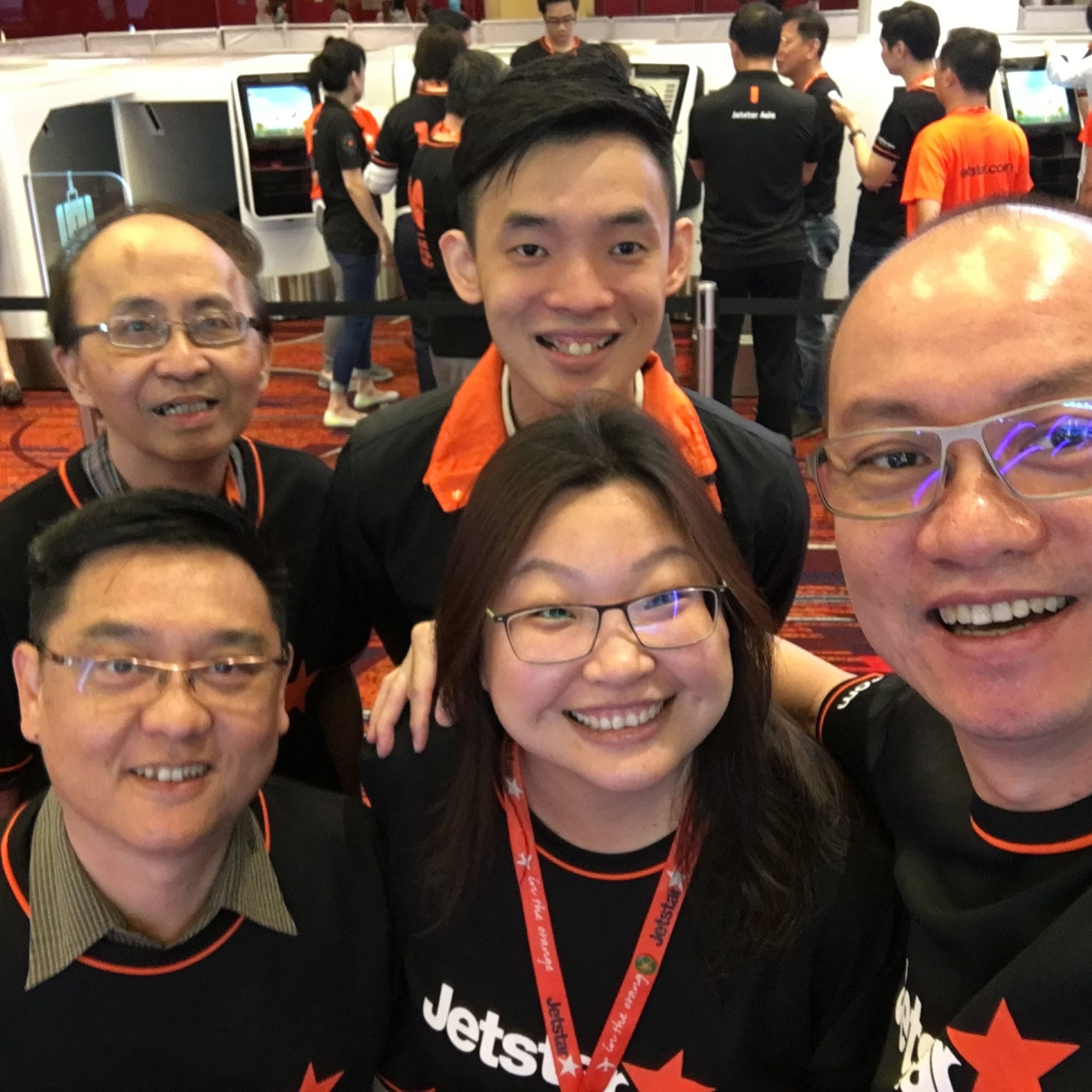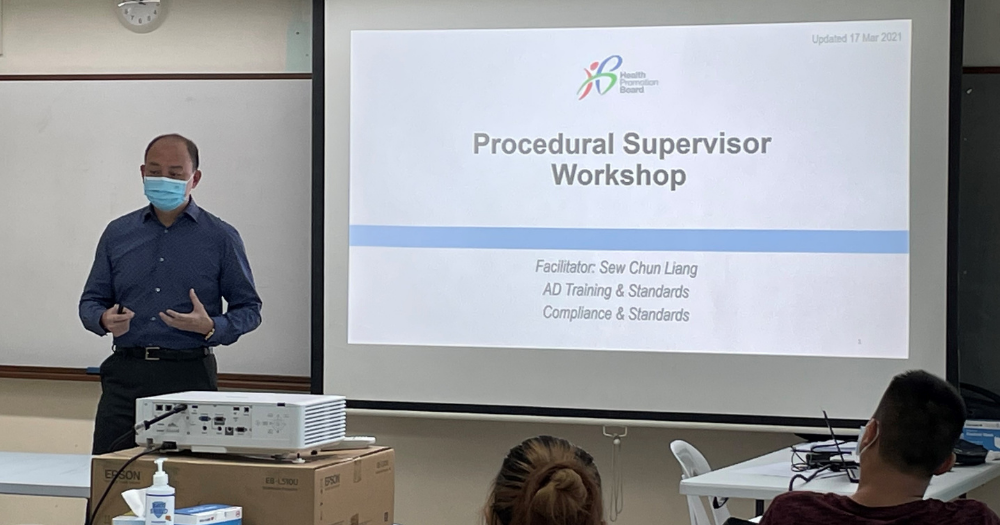Most people over 50 would dissuade others around that age from resigning from their comparatively stable jobs, unless they had no other choice.
But for Sew Chun Liang, the pandemic's effect on the aviation industry was just the motivation needed to overcome the inertia preventing him from pursuing his passions.
“When the pandemic hit, I could have stayed on to see how things would go. But when I did a self-reflection, I thought that perhaps this is a good opportunity for me to explore my real passion,” said Sew, during a video interview.
That inertia has held Sew back for a while now.
Four years ago, as he was about to retire from the Republic of Singapore Air Force, Sew had already harboured an aspiration to become a leadership and performance coach, and pursue a career in training development. He hesitated then, because he managed to quickly secure a job at Jetstar, and decided that it might be useful to gain experience in the private sector first.
Four years later, things were a bit different. As early as June last year, Sew resigned so that he could enrol in the Advanced Certificate in Learning and Performance (ACLP) - a course that would equip him with the required skills in facilitating and developing training programme.
“I really made up my mind that I wanted to leave, to focus on training. Initially, my idea was to just take a break. Just resign and focus on completing this course first.”
“I could have held on to my previous job while attending this course, but I decided I wanted to make a clean cut and make this change.”
‘Knocking on doors’
When asked about how his family reacted to this life-changing decision, he said that he definitely faced some apprehension.
“It was a difficult conversation,” said Sew.
“But I am very fortunate that they are very supportive as they understand that it is something I really wanted to pursue.”
While the “clean cut” gave him the freedom to pursue any opportunity he wanted, Sew had to first seek them out.
Before our conversation, I thought that Sew landed his current job at the Health Promotion Board (HPB) quite easily, given his impressive resume.
But he shared that he had sent out no less than 10 applications after leaving Jetstar and faced “a couple of rejections”.
“You can imagine, at this age, when you attend interview, wah jia lat,” said Sew, who used a Hokkien phrase to mean “to be on the receiving end” of sharp questioning.
“Sometimes you could have embarrassed yourself during interviews, or resume not written properly. You could even be sending numerous resumes, but never even get any reply. You are bound to face rejections.”
But Sew continued to persevere.
When asked about how he remained positive through these rejections, Sew said that it helped that he identified what exactly his passions are, and the next career he intended to pursue.
“So, I continued to keep knocking on doors. But when I did not get the outcome that I had wanted, I just continued to persevere on...because that is something that I believe in.”
 Sew with his colleagues at his previous company, Jetstar.
Sew with his colleagues at his previous company, Jetstar.
Believing in yourself and knowing your value
Besides staying positive, Sew had two pieces of advice for career switchers.
The first is self-belief.
Sew said that sometimes the greatest challenge to overcome is not inertia but self-doubt, especially when you have already spent a long time in an industry.
“For example, if you had spent a long time in aviation, then you would feel that… I don’t have any other skills. How can I pursue something completely different? How can I contribute in other areas?”
But Sew said that “that’s not true”, and even though career switchers might lack industry specific knowledge, “there are other areas that would definitely be useful.”
“I think we must believe in ourselves that besides having the working experience and knowledge, we do have the skills and abilities that would be treasured.”
“But self-belief can only carry us so far.”
Sew said that it is also important for the career switchers to recognise what they want and prepare themselves for it.
“We cannot expect a job to just be given to us because we are ‘someone’ from a previous industry. I don’t think it works that way.”
Sew said that besides interest, one way to identify an industry you can switch to is to think about what skill hirers are looking for.
“If we decide to move on and enter a different field, then we need to equip ourselves with some of these relevant skill sets ...so that when we move, we can really bring value immediately.
I suppose that once we have that ready, it will facilitate a smoother transition.”
Combination of past and future
In the end, Sew is thankful to have been able to get a position as an Assistant Director of Training and Standards, Testing Operations Task Group at HPB.
Sew said that the opportunity came because of proactive career support by Jetstar’s senior management.
He said: “They knew that I'm pursuing opportunities in the coaching area, so whenever there are opportunities, they would check if I am interested to apply.”
From his description, the position seems to be a perfect combination of his aspirations and his previous knowledge.
Sew is currently in charge of developing the Standard Operating Procedures for swabbing, and also facilitating training sessions to support swab operations. He also oversees the deployment of audit teams at the swab sites and analysis of the audit returns.
The position was created under the SGUnited Job and Skills Initiative, which offers a variety of long and short-term roles to meet future and immediate needs.
“In the training role, I am able to immediately apply what I learnt from the ACLP. Coupled with the operations experience that I have garnered all these years, I am able to contribute fruitfully in my current role,” said Sew.
“In a way, all these came in-place quite nicely as I continue to build upon my passion.”
When asked why — of all things — was his passion to become a trainer, Sew said that it is the positive growth he sees in people that he finds to be “extremely fulfilling”.
He said: “It always inspires me when I know I have made a difference in someone’s professional development.”
And I guess, at the end of the day, the feeling of fulfilment and inspiration is sufficient reason for one to make bold decisions like this.
This sponsored article is brought to you by the Public Service Division. Visit careers.gov.sg to find out more about jobs in the Public Service.
Top image from Sew Chun Liang.
If you like what you read, follow us on Facebook, Instagram, Twitter and Telegram to get the latest updates.
